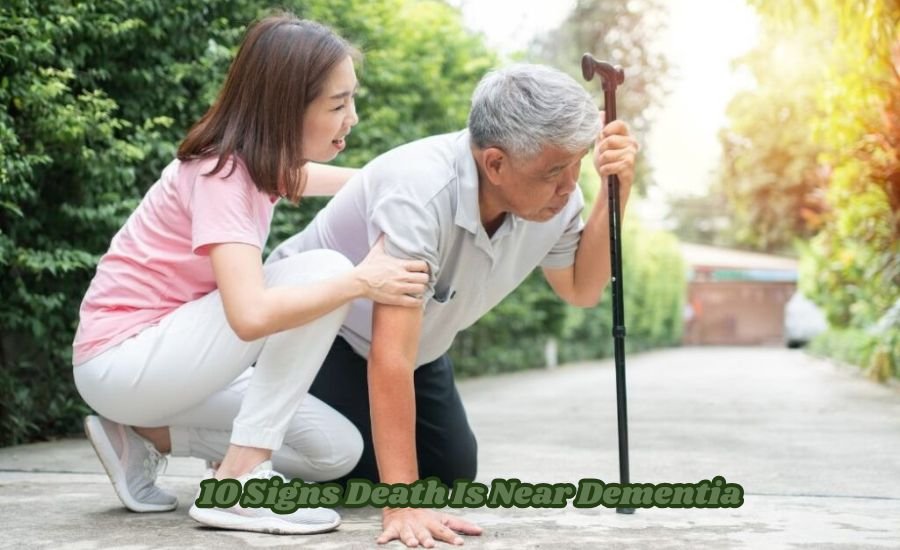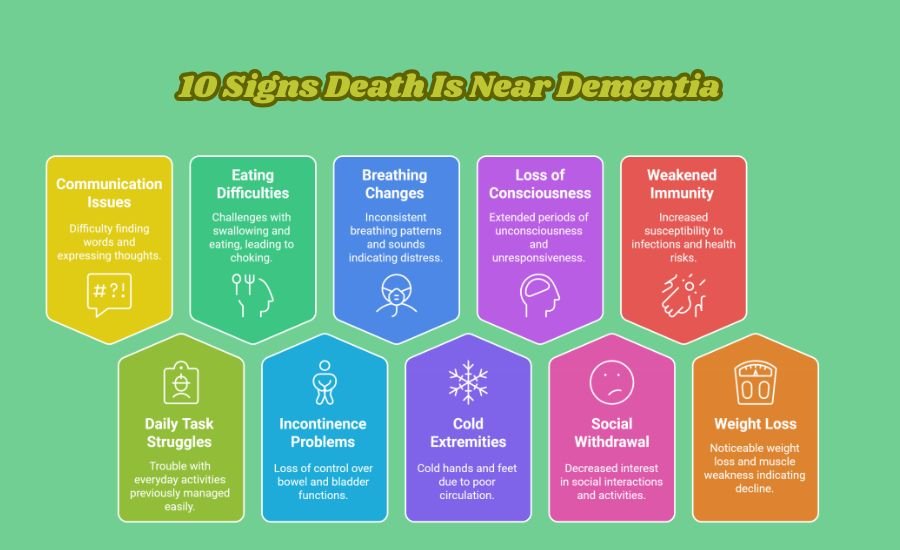Seeing a loved one suffer from dementia is very hard. As the disease gets worse, there are 10 signs death is near dementia that you should know. These signs help families understand what’s happening and prepare for the final days.
At thetuambia, we believe that knowing these signs can help you give love, care, and comfort to your family member. In this blog, we will explain the signs of nearing death in simple words so you can understand what to expect.
Increased Sleeping Time
When a person is near the end of life, they start sleeping more. 10 signs death is near dementia. This happens because their body is getting weaker. They need more rest and have less energy to move or talk.
Each day, they may spend more time in bed. They will wake up less and might not respond much when you talk to them. It is important to keep them comfortable and let them sleep as much as they need.
Family members can sit beside them, hold their hand, or speak softly. Even if they do not reply, they may still hear and feel your presence. This can bring them comfort and peace.
Less Interest in Eating and Drinking
As the body slows down, hunger and thirst also decrease. 10 signs death is near dementia. The person may stop asking for food or drink and might have trouble swallowing.
Trying to force them to eat can be stressful. Instead, offer soft foods or sips of water if they are still willing. Keeping their lips moist can help prevent discomfort.
Caregivers should watch for signs of choking. If swallowing becomes too difficult, it is best to consult a doctor or hospice care team for guidance.
Difficulty Swallowing

When dementia reaches the final stage, swallowing food and drinks becomes hard. This can lead to coughing, choking, or food going into the lungs. 10 signs death is near dementia
If swallowing is a problem, doctors may suggest thickened liquids or a soft diet. Some families choose to feed with a tube, but this is a personal choice.
Keeping the person’s mouth clean and moist can help them stay comfortable. Wetting their lips with a sponge or offering ice chips can be soothing.
More Confusion and Memory Loss
Dementia already causes memory problems, but in the final stage, confusion gets worse. 10 signs death is near dementia. They may not recognize family members or understand where they are.
They may talk to people who are not there or seem lost. It is important to stay calm and gentle, even if their words do not make sense.
Speaking softly and using simple words can help. Sometimes, just holding their hand and smiling can bring them comfort.
Changes in Breathing Patterns
Breathing may become slow and irregular. Some people breathe very fast, then pause for a few seconds before breathing again.
A gurgling sound, called the “death rattle,” may happen as fluids build up in the throat. 10 signs death is near dementia. This can be upsetting to hear, but it does not cause pain.
Keeping the head raised can help. Doctors or hospice nurses may suggest medicines to reduce discomfort.
Cold Hands and Feet

As the body prepares for the final stage, blood moves away from the hands and feet to keep the important organs working. 10 signs death is near dementia.
Their skin may feel cold and look pale or blue. This is normal, and there is no need to worry.
Covering them with a soft blanket can help them stay warm. But heavy blankets may be uncomfortable, so light coverings are best.
Less Communication
At the end of life, talking becomes harder. The person may only say a few words or stop speaking completely.
Even if they do not respond, they can still feel love and care. Holding their hand, playing soft music, or reading to them can be comforting. 10 signs death is near dementia.
Sometimes, a person may suddenly say something clear or smile before they pass away. This is called a “final rally,” and it is a special moment for families.
Restlessness or Agitation
Some people become restless and move their arms or legs a lot. They may look anxious or upset. 10 signs death is near dementia.
This can happen because they are confused or uncomfortable. Talking softly and holding their hand can help calm them down.
Doctors may give medicine to help with restlessness if it becomes too much. Keeping the room quiet and peaceful can also make them feel better.
You Need To Know: Which of the following statements is true
Increased Risk of Infections
When the body gets weak, it cannot fight infections well. Many people with late-stage dementia get infections like pneumonia or urinary tract infections. 10 signs death is near dementia.
Fever, cough, or trouble breathing could be signs of an infection. Doctors may give antibiotics, but sometimes, treatment does not help much.
Keeping the person comfortable is the main goal. Families should talk to the doctor about whether to treat infections or focus on comfort care.
Withdrawal from Loved Ones

As death nears, people with dementia may stop responding to family and friends. They may seem distant or stare into space. 10 signs death is near dementia.
This does not mean they do not love you. It is just part of the body shutting down. Your presence still brings them comfort.
Holding their hand, sitting quietly, or playing their favorite music can make their final moments peaceful. Love and care are the best gifts you can give.
Conclusion
Taking care of someone with dementia is hard, especially in the last stage. When you see the 10 signs death is near dementia, you know your loved one needs more care and love. They may stop eating, sleep more, and have trouble moving. 10 signs death is near dementia. It is important to be there for them, hold their hand, and keep them comfortable.
Even though it is sad, knowing what happens can help you be strong. Hospice care and family support make this time easier. 10 signs death is near dementia. Remember, your love and care matter the most. Stay patient, speak softly, and cherish every moment with them.
You Should Know: Snowbreak Locate Uninterruptible Power Supply
FAQs
Q: What are the 10 signs death is near dementia?
A: Some signs include trouble swallowing, sleeping more, weight loss, weak body, and breathing changes.
Q: How long does the final stage of dementia last?
A: The final stage can last from a few weeks to several months, depending on the person.
Q: What happens when a dementia patient stops eating?
A: They may become weak and need soft food or liquid nutrition. Hospice care can help manage this.
Q: Can dementia cause sudden death?
A: Dementia itself does not cause sudden death, but complications like infections can make it happen faster.
Q: Should I call hospice for late-stage dementia?
A: Yes, hospice care helps keep the patient comfortable in their last days.
Q: Why does a dementia patient sleep so much near the end?
A: Their body is slowing down, and they need more rest.
Q: What is the most common cause of death in dementia?
A: Pneumonia, infections, or organ failure are common causes.
Q: How can I comfort my loved one with dementia near the end?
A: Hold their hand, play soft music, and speak gently to keep them calm.
